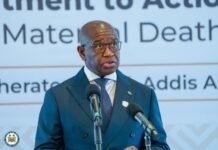By Ibrahim Sorie Koroma
In a sobering address at the World No Tobacco Day Commemoration ceremony on May 31st, Dr. Santigie Sesay, Director at the Directorate of Non-Communicable Diseases and Mental Health in the Ministry of Health, revealed that tobacco use is responsible for 3,330 deaths each year in Sierra Leone. Speaking at the Freetown City Council, Dr. Sesay highlighted that while tobacco may not be the sole cause of these deaths, it significantly contributes as a risk factor.
Dr. Sesay emphasized that 900 of these deaths are due to exposure to second-hand smoke, which is preventable. He expressed concern over the high number of tobacco users, stating that 955,000 adults and 4,000 children aged 10-14 consume tobacco products annually. This alarming statistic underscores the urgent need for comprehensive action from all stakeholders.
Linking tobacco consumption to various health risks, Dr. Sesay pointed out that between 2016 and 2018, Sierra Leone recorded 4,125 new cancer cases, resulting in 3,002 deaths. He attributed tobacco use in various forms—smoking, chewing, sniffing, and shisha use—as a significant factor in heart attacks, sudden cardiac deaths, respiratory infections, and hypertension.
Dr. Sesay also highlighted the severe impact of tobacco toxins on pregnant women, which can lead to complications such as bleeding, ectopic pregnancy, miscarriage, stillbirth, cervical cancer, early menopause, menstrual disorders, and erectile dysfunction in men.
Addressing the dangers of second-hand smoke, Dr. Sesay stressed that it poses greater health risks to non-smokers, who he termed “silent consumers.” He called for robust action to implement the Nicotine and Tobacco Bill, noting that second-hand smoke affects many who do not actively smoke.
He outlined the potential benefits of fully implementing tobacco control policies, including taxation, smoke-free policies, advertising restrictions and public health campaigns. These measures, part of the Narcotic and Tobacco Bill and the WHO Framework Convention on Tobacco Control (FCTC), could prevent 19,000 deaths and save 1.3 trillion Leones in economic losses over 15 years.
Dr. Matshidiso Moeti, WHO Regional Director, lauded Sierra Leone’s progress in the fight against tobacco use, particularly the enactment of the Narcotic and Tobacco Bill by the Parliament. She urged accelerated implementation of the WHO FCTC, especially stringent measures against marketing new and emerging tobacco and narcotic products aimed at youths, including shisha, e-cigarettes and narcotic pouches, often promoted through social media.
The ceremony underscored the critical need for continued efforts and collaboration to combat the tobacco epidemic in Sierra Leone, aiming to safeguard public health and reduce the burden of tobacco-related diseases.




